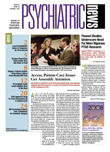Each year mental illness costs Americans $216 billion, or 16 percent of the more than the $1 trillion cost of the seven most common chronic health conditions, in terms of treatment and lost productivity.
This was a startling finding of a recent study conducted by the Milken Institute, a California economic think tank. The researchers found that 30.3 million Americans were receiving outpatient care for a mental illness in 2003, the last year for which the statistics were available. The study, which was based on 2003 data from the Census Bureau and the Agency for Healthcare Research and Quality, did not count people in institutional care, such as those in prison or nursing homes, for any health conditions.
The study determined that the economic impact of the seven most common chronic illnesses, which are mental illness, cancer, hypertension, heart disease, pulmonary conditions, diabetes, and stroke, goes far beyond the expense of treating disease. It found the cost of treatment of the conditions accounted for only 21 percent of their total costs; the remainder was due to lost productivity. Lost productivity was in the form of extra sick days, reduced performance by ill workers, and other losses not directly related to medical care, according to the study.
The study authors concluded that life-style changes, disease prevention, and early detection of disease could reduced the number of illnesses by 40 million cases and save $1.6 trillion from 2003 to 2023.
Lifestyle changes are needed, the authors said, because the number of all chronic health conditions is growing, including the number of cases of mental illness. Although the population is expected to grow by only 19 percent between 2003 and 2023, the study authors estimated that the number of cases of mental illness will increase by 54 percent.
The biggest cuts in the growth of chronic health conditions would come from reducing obesity and smoking, although significant mental illness prevention also is possible, according to the authors.
If the country does nothing to address these problems, the number of cases diagnosed in the seven illness categories will increase by 42 percent by 2023, for a total economic impact of $4.2 trillion, the report said.
“The disease burden is mounting, the economic burden is mounting, and the trajectory we're on is unsustainable,” said Richard Carmona, M.D., a former U.S. surgeon general and now chair of the Partnership to Fight Chronic Disease, at a September news conference in Washington, D.C.
The study authors noted that the reduction in future chronic illness is unlikely to come from the tiny amount of current U.S. health care spending on discouraging unhealthy behaviors that contribute to those conditions, such as abusing alcohol and drugs, in the case of mental illness.
“The current health care debate rightly focuses on the extension of coverage to the uninsured and the design of a financing mechanism that is both fair and efficient,” said the study authors. “We suggest that the nature of services provided—the failure to invest in prevention and early intervention—deserves equal place in the debate.”
They estimated that such steps could reduce the annual number of new cases of mental illness from 46,673 in 2003 to 40,910 in 2023. Such measures to prevent mental illness could cut $28 billion in annual treatment costs and $88 billion in annual related economic costs by 2023.
The mental health cost savings could come, in part, through measures that would reduce alcohol abuse, which affected 5.8 percent of the population in 2003. Their optimistic projection would reduce that to 4.2 percent of the population by 2023.
The projected reduction in mental health conditions also could stem from a gradual decline in illicit drug use. The authors calculated that educational efforts to increase awareness about the risks of illicit drug use would cause such use to plateau in the share of the total population affected. They projected that after 2010 illicit drug use would begin a downward trajectory.
The projections also assumed “a very slight acceleration” in the availability and use of new treatments for mental disorders and other conditions. Health care costs also are expected to drop for all conditions due to a host of changes that improve the efficiency of care for chronic conditions and increase coordination of this care. Additionally, they expect more widespread treatment that adheres to accepted guidelines, efforts to improve patient adherence to prescribed therapies, and faster adoption of health information technology.
“While these assumptions are optimistic, they are not beyond our reach. They address the most frequently cited behavioral risk factors and our own calculations of the statistical relationships between the risk factors and each condition,” said the study authors.
The Milken Institute is part of a coalition of 87 medical groups, businesses, and pharmaceutical companies that recently pushed for detection and prevention efforts to receive more attention in the national health care debate. The study was funded in part by a grant from the Pharmaceutical Research and Manufacturers of America.
“An Unhealthy America: The Economic Burden of Chronic Disease” is posted at<www.milkeninstitute.org/pdf/ES_ResearchFindings.pdf>.▪
